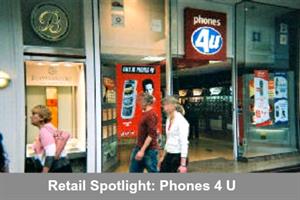|
Founded in 1987 by the Caudwell Group, Phones 4 U was the UK's fastest growing independent mobile phone retailer with more than 690 stores across the UK and Northern Ireland, and an online shopping facility. On 26 September 2006, the business was sold for a sum of £1.46 billion to private equity firms Providence Equity Partners and Doughty Hanson, before later being sold on again to BC Partners in 2011.
It was announced last week that Phones 4 U is the latest high street name to succumb to administration. Looking more closely, it seems that while the major mobile phone retailer was still a profitable business, with turnover of £1bn and underlying profits of £105m last year, losing key contracts with EE and Vodafone meant that the company could no longer operate.
So, this is an unusual retail administration situation. We’ve taken a look back at the trading history of Phones 4 U, to see how the brand evolved.

On 17th September 2014 - it was reported that Dixons Carphone offered to hire the 800 people who work in Phones 4 U concessions at its Currys and PC World stores after Phones 4U went into administration two days beforehand.
15th September 2014 - Phones 4 U fell into administration after loosing their key contract with EE, soon after losing Vodafone, announcing plans to close its 550 stores
8th September2014 - Phones 4 U owner BC Partners started exploring new options for the retailer following Vodafone’s decision to not renew its contract with the firm.
4th September 2014 - The ratings agency, Moody’s, warned clients that the mobile phone retailer was under review for a downgrade, because of its debts and the loss of the Vodafone deal.
2nd September 2014 - Phones 4 U revealed that network operator Vodafone would not be renewing its contract agreement, leaving them with only one mobile network partner - EE.
19th August 2014 - Phones 4 U announced it would be looking for over 100 new stores as it prepared to close its concessions in Currys, following the merger of Currys’ owner Dixons with Carphone Warehouse.
18th July 2014 - Phones 4U launched an ad campaign entitled ‘For the future you’, developed by adam+eveDDB. The campaign was designed to highlight the knowledge that Phones 4u can provide to customers in-store; helping customers choose a phone that suits them.
22nd January 2014 - Phones 4 U owner, BC Partners, started looking at options for Phones 4 U, including a float.
31st July 2013 - The Manchester Arena was renamed the Phones 4 U Arena after the brand agreed a five-year sponsorship deal.
22nd January 2013 - Phones 4 U launched a mobile network business called LIFE Mobile later in 2013 that used the 4G services being rolled out by EE across the UK under a wholesale arrangement.
12th November 2012 - Phones 4 U appointed Johnson Fellows to handle its UK store portfolio, consisting of more than 650 outlets.
8th October 2012 - Phones 4U recorded a rise in pre-tax profits from £87.6m in 2010 to £113.4m in the year to December 31, 2011. Sales rose from £746.2m in 2010 to £773.3m in 2011 driven by sales of high value smartphones.
This is not a typical retailer’s slide into administration, as we have seen in other cases such as with La Senza and Internacionale. Instead, what we’ve seen with Phones 4 U is how vulnerable many of our retailers still are, whether it is obvious or hidden beneath an apparently successful exterior. Until this year, Phones 4 U showed all the signs of a business coping with the competition and challenges of the current high street and in particular within the mobile phone sector. With a significant store portfolio, strong online offering, a concession deal with Currys and the launch of a new mobile network business – the signs were positive.
However, the loss of three significant deals in 2014 undermined that success with huge impact. Currys owner, Dixons’, merger with Carphone Warehouse in August saw Phones 4 U facing the end of their in-store concession deal with Currys; Vodaphone decided to not to renew their contract agreement at the beginning of September; and two weeks later 4G network operator EE followed suit, leaving Phones 4 U alone, and stuck. This goes to show how fine the line is between success and failure for our retailers, even as the economy continues to recover and our high streets to stabilise. Phones 4 U chief executive David Kassler summed it up: "A good company making profits of over £100m, employing thousands of decent people has been forced into administration."
The lesson to learn here is one of strategy and future proofing. As a facilitating business, Phones 4 U relied on their partnerships and without these they didn’t have a viable proposition. Even the most seemingly successful brands need a contingency plan.
|